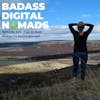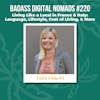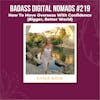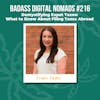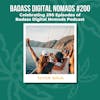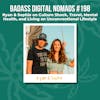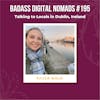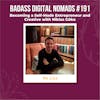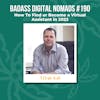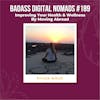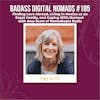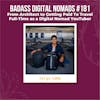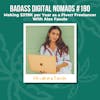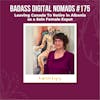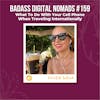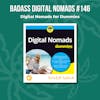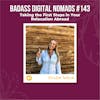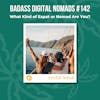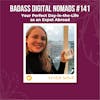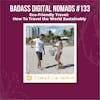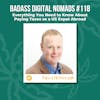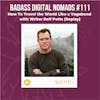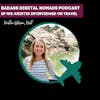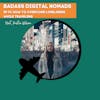The Best Way To Learn a Foreign Language (Fast)

Want to learn a new language and fit in with foreign cultures? Kristin shares how she learned Spanish in one month and how you can become fluent in another language - fast. Plus, her tips on living with locals abroad and how to learn a language from home (if you can't travel yet).
Want to learn a new language and fit in with foreign cultures? Kristin shares how she learned Spanish in one month and how you can become fluent in another language - fast.
Plus, her tips on living with locals abroad and how to learn a language from home (if you can't travel yet).
Episode 151 Special Offers:
- Get 20% off Organifi Superfood Blends and Travel Packs 🌱
- Pre-Order Digital Nomads for Dummies
- Join the Digital Nomad Visa Database
Topics & Questions Answered:
- What is the best way to learn a foreign language?
- What is language immersion?
- How immersion helps you integrate with a local culture.
- How to find an international homestay?
- What to look for in foreign language schools.
- Tips for learning a language abroad.
- The best online language learning tools.
Show Notes & Resources:
- Kristin's language school in Costa Rica
- Book: 501 Spanish Verbs
- Find a homestay with Homestay.com or Lingoo.com.
- Rotary Scholarships
- Online Language Learning:
- Babbel: Babble helps you learn languages through a combination of lessons, live online classes, podcasts, games, videos, and more.
- Duolingo: A fun, free, and effective way to start learning a language in just 5 minutes per day.
- iTalki: Get 1-on-1 lessons in more than 150 languages and practice talking with others in the community for free. This site is great for talking to real people.
- Lingopie: the world’s only language platform that helps you learn tv shows and movies.
- Pimsleur: Get access to 51 languages for around $20 per month.
- Rocket Languages: People and companies alike love Rocket Languages, which uses a variety of different learning techniques for different learning styles.
...........................................................................................
Connect with Kristin:
- Follow on Instagram
- Subscribe to Traveling with Kristin on YouTube
- Subscribe to Digital Nomad TV on YouTube
- Join the Badass Digital Nomads Facebook Group
...........................................................................................
Support the Badass Digital Nomads Podcast:
- Buy Kristin a Coffee
- Become a Patron
- Leave a 5-Star Review
- Buy Official Merch
- www.badassdigitalnomads.com
...........................................................................................
A special thank you to Kristin's Patrons: Walt, Shawn, Richard Y, Heather, Karen, Kiran, Scott, Michael J, Isaac, Mike M, Yasmine, Erick M, Yohji, Ron, Gary, Annie, Henry L, Keith, Stephen, Warren, James, Daniel, Gary B, Emily, Rich, Phil, Anthony, Jennifer, Kathleen, Natalie, Dave B, Brian, Christopher, CJ, David G, Mike R, Chip, Shelly, Ron, Paul, Andy, Jeffrey, Paulo, Stephen, Michelle, DJ, Francis, Dave M, Carlos, and Ron
Become a Patron for $5/month at Patreon.com/travelingwithkristin
Special thank you to Jen for the new review on Podchaser! ❤️
...........................................................................................
Podcast descriptions may contain affiliate links of products and services we use and recommend at no additional cost to you.
Sneak Peek:
Kristin: 00:00:00 Living with the locals, not near the locals, not next to the locals, but living with local people from the first day that you step foot into a new country and really avoiding foreigners like your life depends on it.
Introduction: Welcome to Badass Digital Nomads, where we're pushing the boundaries of remote work and travel, all while staying grounded with a little bit of old school philosophy, self-development, and business advice from our guests.
Kristin Wilson, Host: 00:00:37 Hey there, Kristin from traveling with Kristin here and welcome to episode 151 of Badass Digital Nomads on how to learn a language fast. If you are thinking of traveling or moving to another country, then learning the language is probably at the top of your list, especially if you wanna have any chance of integrating with the local culture. But if you've ever taken a language class in high school, you know how difficult learning another language can be and how long it can take. I've definitely been there. So in this episode, I'm going to share with you how I started speaking and understanding Spanish in less than one month and how you can do it too. So you're probably thinking, how the heck did I learn Spanish in just one month? Well, back when I was 19 years old, I applied for a Rotary ambassadorial scholarship. My initial idea was not to learn Spanish, however, it was to get an all-expenses paid trip to Australia where I could go live on the beach study and surf because back when I was in college, my life revolved around surfing.
Kristin: 00:02:03 Anyway, once I was a few months into this lengthy application process, I realized that I had it all wrong. <laugh>, the purpose of the Rotary Ambassadorial Scholarship program wasn't to help students study abroad like I thought. Initially, it was an exchange to send people of all ages as ambassadors of their home countries to countries all around the world. So basically sending regular people to other countries so that they could learn a new language, learn a new culture, and learn the customs of the local people. So scholarship recipients got to go for either three months or six months. I think there were different lengths of programs that you could apply for, and you would have your room and board paid for and your language lessons. But in exchange you were expected to get involved in the community, uh, doing community service, and, and this is the most terrifying part, you would commit to giving three speeches in the native language at three different rotary chapter meetings.
Kristin: 00:03:16 So just imagine moving by yourself to another country, living with a local family, learning the language - ASAP, and then doing some public speaking in that foreign language. Now I know that public speaking is up there with the biggest fears that people have, right next to probably spiders and cockroaches <laugh>. So yeah, just imagine giving a speech to real people, like a room full of people in a language that you don't know. And that's what I was up against. So I knew that I had to learn this language. I actually ended up getting sent to Costa Rica because newsflash, Australia is an English-speaking country. But yeah, I got the scholarship and I set off for Central America back in the fall of 2002. Now, when I left for Costa Rica, I thought I had a pretty good foundation of Spanish. I had taken Spanish classes in high school.
Kristin: 00:04:23 I had practiced on surf trips to Puerto Rico and Mexico. But let's just say that my skills were not so good. So if you've ever taken Spanish 101 or French 101 in high school or college, you know that it doesn't get you that far. Like, you probably spent most of your time memorizing vocabulary words five minutes before a pop quiz. And they weren't really pop quizzes cuz you knew that they were gonna happen, <laugh>. Anyway, when I got to Costa Rica, I knew two words, Ola and Gracias and that's pretty much it. I can even remember going on my senior class trip to Mexico and freezing up when standing at the cash register of the grocery store, I think the cashier asked me something or she probably was just telling me how much my groceries were and I just stood there like a deer in the headlights <laugh> like I didn't know what to say.
Kristin: 00:05:20 Uh, that's where I was when I arrived in Costa Rica. But fortunately, the people at the Rotary Foundation knew what they were doing and this combination of full cultural immersion coupled with language classes a few days a week is really effective. So I went from knowing two words to within a matter of a couple weeks, being able to sit down at dinner with my host family and have full conversations with them. I could talk to people at bars and restaurants, and within the first month I was traveling around the country by myself. And if you've ever been to Costa Rica or really any foreign country, you know that navigating the public transportation system is no small feat. Fast-forward to the end of my three-month stay, and I was able to give those three different speeches in Spanish at different rotary meetings around the country. And by the end of my stay I was also reading Spanish literature with my Spanish teacher, and we were discussing it as if I were in my high school English class.
Kristin: 00:06:37 That was pretty shocking. I mean if you would've told me at the beginning of my stay in Costa Rica that I would be reading Spanish literature three months later, I would not have believed you. But it is possible. And the secret of how I was able to do this is two simple things. Immersion with language classes, simple but not easy. So what does immersion actually mean? It sounds so good to be able to immerse yourself in a foreign culture. It's just like go there and wrap yourself in this blanket of cultural immersion. Uh, but the reality is that immersion can be a little bit uncomfortable and a little bit awkward. So in the case of immersion for language purposes, it's basically taking off your life raft and just jumping into the deep end, living with the locals, not near the locals, not next to the locals, but living with local people.
Kristin: 00:07:46 From the first day that you step foot into a new country, that means no booking Airbnbs or no spending five months looking for rental properties online. Just living with a locals and really avoiding foreigners like your life depends on it at first because when I first learned Spanish, we didn't have Facebook and social media and FaceTime and all of the things that allow you to communicate so easily with your friends and your family and people all over the world. So when you take this path to learning a language, you kind of want to go into hiding. You wanna become like a hermit and try to protect yourself from any form of English. So maybe that means taking a media fast or a social media fast and waiting to go to any of those InterNations meetups or expat meetups or co-working spaces and things like that until after your language immersion.
Kristin: 00:08:55 Now you can choose as long of a period as you want. I recommend at least one month to start because it's like doing anything. It's like building a new habit. It's like changing your diet. The first few days or the first few weeks are basically going to suck. Like it's gonna be really uncomfortable, it's gonna be really hard, but eventually you're going to find your flow, you're going to find your groove, you're going to build on the consistency of day in and day out living with a host family going to language school, and it's going to get easier. The complication comes when you are working full-time at the same time that you're traveling. So I think it would be quite difficult to be taking language classes and working at the same time. I actually took an entire semester off of school to go to Costa Rica and learn Spanish.
Kristin: 00:10:00 So I didn't have to worry about taking biology class and business 1 0 1 at the same time that I was learning Spanish. Now not everyone has this luxury, but if you are a freelancer or you run your own business or you're working part-time or you're retired, if you have any free time, try to coordinate your language immersion with a time that you don't have a lot of work to do or any work to do. Maybe if you are a traditional employee, and you want to learn a language, you can take a two week or a one month paid vacation and use your vacation days to learn a language. But if you are a remote employee, then you can also use your paid time off or maybe even get reimbursed by the company to go learn a language. So the the goal is to choose the longest period of time that you can to learn at first and then to also protect that time so that you can really focus on just the language and not a host of other responsibilities, freelancing clients fires to put out at work because all of that is going to divert your energy away from the goal, which is to learn the language.
Kristin: 00:11:19 And I can tell you, you are going to learn more in even one week or one month of a home, stay living with a local family than you would in probably a year of living in your own apartment or Airbnb in that same country. You eat there, you sleep there, you do your homework there, you talk to the family, you talk to the parents, you talk to the kids, you get to know them, you get to see how they live literally from the inside out, from inside their home. And you get to observe. You get to listen to what they talk about. You begin to understand the current events and the issues that are important to them. It's always very interesting. I can remember hearing my host mom and dad talking about the Costa Rican economy, talking about the exchange rate with the US dollar, and talking about the hard day that he had at work as a security guard in downtown San Jose.
Kristin: 00:12:26 Like these are all real human things that you start to be able to learn about and that was all in Spanish. The other cool thing that happens is you start to get influenced by your environment. You start to feel more empathy and connection with the local people. You start to meet the neighbors, you start to meet, you know, friends of friends, and you begin to take on the local accent. This is really cool. I didn't even know when I moved to Costa Rica that there were different Spanish accents. There's actually different accents even in different parts of the country, and that is definitely applicable if you're in a much larger country like Mexico or Argentina or Brazil. I was always surprised when I moved to Nicaragua a few years later, and they asked me if I was Costa Rican because of my Spanish accent. So that comes of course from learning the language in any country, but I think that you adopt the accent in a much more nuanced way when you live with a host family.
Kristin: 00:13:41 So that is the first part of the language learning strategy is cultural immersion and living with a family. The other side is actual practical day-to-day classes. Now, is it possible to learn the language on the fly? Yes, of course. And there's plenty of people who have learned that way or learned because they had a boyfriend or girlfriend who was a local, but that's gonna take a bit longer. And I like the combination of immersion with classes because we're all adults, we've all gone to many, many years of school, and we know how to learn. So you're able to apply your adult brain and learning skills that you've acquired through school and through your job and just through life. And you get to combine that with the kind of more childlike or scientific observational skills and mimicking that you get to do on the immersion side because you're gonna spend a lot of time just being silent at first.
Kristin: 00:14:52 You're gonna spend a lot of time watching and listening and copying and your brain is just taking in all of this information that is going to then help you when you are speaking the language. So I went to school three or four days per week, but I chose to go more days. I think I had the option to go only two days per week or something like that, but I just went all in. And so if you're taking time off work or you're dedicating this one month of time to learning the language and not sightseeing or traveling or something else, then you might as well go as many days as you can. Um, I took four days a week because I wanted to have long weekends to be able to travel around the country and also give my brain a little bit of a break because this is how I got addicted to coffee was immersion.
Kristin: 00:15:46 I mean you just can get exhausted by having to think about every little thing that is usually automated in your life like ordering food or answering questions or talking on the phone or it does take a lot of cognitive energy, and you are gonna want a break. Like you're gonna get a little bit burnt out at times but it's for your own good. Trust me. I guess you could say that immersion mixed with the structure of in-person classes is kind of like a traditional education mixed with a mentorship, mixed with an apprenticeship mixed with real life all at the same time. But when you remove the immersion part, and you only try to learn through books or through recordings or through watching tutorials, it's kind of like watching someone brush their teeth for a year but then never trying it <laugh>. You know how awkward kids are when they first start learning to brush their teeth, and they can't even hold the toothbrush like, but then eventually you just brush your teeth, and you don't even remember what it was like learning to brush your teeth.
Kristin: 00:17:02 That's how language was for me. At first, it was really awkward and uncomfortable and I felt like people were laughing at me and they probably were. But eventually it comes to this point where it just clicks. It doesn't even make sense in that moment, but it's almost like from one day to the next or one moment to the next, you go from not understanding to like understanding everything and you never know when that moment is going to happen. But that moment comes faster when you are applying what you've learned in the classroom or in the books. And the reason I think it's good to do this first is because when you move to another country or if you're traveling from place to place, you're gonna be busy with stuff like you're gonna meet people, you're gonna wanna see the sites, you might be working remotely.
Kristin: 00:18:02 And I've seen it hundreds of times with my relocation clients is they go to a country and they want to learn the language but then that somehow doesn't become the top priority once they get there. There's like all this other stuff that happens because you know life is happening at the same time. And so that's why I think that prioritizing the language first and kind of putting the tourist part on hold and putting your social life on hold at the beginning can really provide a good foundation for you that then you can step onto and use that as like a springboard into the rest of your time in that destination. Now of course we're talking about if you have a long amount of time to be there, maybe three months or six months or one year, but the harder that first month is and the more a hundred percent effort that you put into learning the language, the easier the rest of your life will be in that country.
Kristin: 00:19:09 And it doesn't mean that you need to be completely antisocial during that time. Just prioritize conversing with locals. You can still go out, you know, talk to the Uber drivers, talk to the waiters at restaurants, uh, talk to people that you meet at bars and clubs and restaurants and go out to events, go to house parties. I can't tell you how many times I was sitting at night at someone's house party with everyone you know, passing around a bottle of Johnny Walker and I'm just like trying to process Spanish. And eventually, you start to understand but you really need to surround yourself with people speaking the local language. And uh, combining all of these things together helps you learn a lot faster than just doing one at a time or you know, working full-time from another country and then taking a Spanish class like one hour per week or something like that.
Kristin: 00:20:13 And also these days a lot of people do speak English. So, another reason that the homestay comes in so handy is that these people are getting paid to speak the local language to you. So you might meet a lot of people in your travels who want to speak English to you or they want to practice their English with you. But in an immersion program, these people are getting paid to help you adapt to their culture, and so they're gonna be speaking the local language to you. You also wanna make sure that your teachers at the language school that you're going to, that they're teaching you the language in the local language. So that means learning Spanish and Spanish learning Japanese and Japanese, like when you have a teacher teaching you a foreign language in English, I think that gets in the way of you learning the language.
Kristin: 00:21:14 I mean you're still gonna learn but you learn a lot faster when the teacher's teaching you in the language because your brain doesn't have any other choice. Like it has to adapt to that situation, and it's a really steep learning curve at first, but you're gonna be so relieved and grateful that you did it late later when you hear a lot of other foreigners that are still speaking English, and you're pretty conversational at whatever that language is that you decided to learn. Now there's a lot of ways to find a homestay. If the language school that you want to go to doesn't have any connections, then you can use a website. It's like an Airbnb of homestays. There's homestay.com, there's one called lingoo.com, L I N G O O. And then you can also post in Facebook groups asking people if they know of any homestay opportunities.
Kristin: 00:22:13 And you can also use Google to search for homestays or home exchanges in specific cities or countries. Another thing that happens when you do an immersion is that you get to learn more slang, <laugh>. And this is really fun. I actually bought a book on Costa Rican slang when I was living there and the other book that came in so handy was this book of 500, I think it was 501 Spanish verbs. So in your free time try to learn as much slang as you can and also focus on the verbs. Um, a good language school will focus on grammar and verbs because they know that the vocabulary will come organically. You'll just kind of fill in the blanks when there's a word that you don't know, look it up, write it down. I used to always go everywhere with a dictionary and a notebook, and I just wrote down every word that I didn't know.
Kristin: 00:23:17 Instead of just asking people like, oh, how do you say this? Like could say blah blah blah. You actually look it up, you write it down, and then you can study it for later because you'll find out that you don't need to learn that many words. Like once, you learn the structure of the language, you learn the most important verbs, and you learn the recurring vocabulary words that you'll use over and over and over again. You can learn like a good chunk of the language, like 50%, 80% of the words you're gonna use quite often the same as you would in your native language. So I'll give you a few more tips of how to learn the language on your own once you're in a destination. But first I'd like to introduce you to our new sponsor.
Organifi:
Kristin: 00:24:14 Organifi makes plant-based superfood blends to support your brain, body and immunity. I am currently over here sipping on their gold blend, which is made for rest and relaxation. We can all use a little bit more of that. Am I right? The gold blend is perfect for winding down in the evening. It's packed with healthy ingredients like turmeric, ginger, coconut, cinnamon and reishi mushroom. And it even comes in travel pack versions so you can take it with you on the go, it tastes good too. Organifi is offering a 20% discount for all you badass digital nomads out there using the code travel. So you can get 20% off any of their kits or blends by using the link in the show notes or by going to organifishop.com/travel. That's O R G A N I F I shop.com/travel.
Kristin: 00:25:10 A few other tips that I have that I remember from my experience learning Spanish, um, besides walking around with your notebook and your dictionary and talking to people, obviously talking to people is the most important part. Or not just talking but listening. It's really just a combination of a lot of little things that add up to becoming fluent in a language, taking every opportunity that you can to learn. So that means if you're on a road trip or on a bus, try to translate the signage that you see out the window. If you are calling a local company, choose the Spanish option or instead of the English option, or I'm using Spanish as an example. But you know, choose the local language so you're forced to understand the phone recordings in Spanish or talk to cus uh, customer service representatives in that local language. When you go out to eat, always ask for the menu and the local language.
Kristin: 00:26:14 Try to order your food using the local tongue and remember that learning about a culture is much more than the language. Many countries speak the same language, have completely different cultures. So remember to read what's going on in the local community, read the local newspapers, listen to the news. I used to watch the morning news every day in Costa Rica. I would watch the morning TV shows. They have like their own version of the Today Show or like Good Morning Costa Rica, I forget what it's called now. Um, but every country has their own version of that and I would also read the newspaper and I would drink coffee and I would like sit at a cafe and I would circle words I didn't know or highlight them and then I would look them up and write them down in my notebook and that was really helpful as well.
Kristin: 00:27:12 So you're learning the language while you're learning about the topics and the current events that are important to the locals and also the perspectives and opinions of the journalists. I used to listen to the radio in Spanish. I even read kids books like I would go to the library and like look at kids books. You can also use TV and movies. That's a great way to learn and not just the language but a little bit more about the pop culture of that place. So you can watch TV with English subtitles, you can watch English shows with Spanish subtitles. So this is really helpful actually. If you are watching a movie or a TV show that you've watched a lot of times and you already know like the whole script of the movie and you can probably do this with Netflix and and other Apple tv, you can probably choose different language subtitles.
Kristin: 00:28:17 You could do this on YouTube as well. But if it's something that you know really well, you can then focus on the words instead of just getting lost in the storyline again. And you can also watch something in a foreign language with the subtitles of the language you want to learn. So I used to have this satellite TV when I lived in Costa Rica and I would watch Fashion TV network and I would watch shows about like fashion in Brazil and they're all speaking Portuguese, but the subtitles were in Spanish and I was surprised at how much I understood just from watching in Portuguese and reading the Spanish subtitles. So that helps as well. And then also going to the movies. You can go to English movies with Spanish subtitles or even like let's say you are living in Germany and you're going to see a film that's a Spanish film and it might have German subtitles.
Kristin: 00:29:25 Like there's all these different combinations and it's just like training, it's like brain games to learn in all of these different uh, scenarios. It's like cross training, that's what I wanna say, <laugh>. And you just wanna expose yourself to the language in as many different formats as you can and go for those small wins, go for those 1% gains. And then another fun way of learning is having a boyfriend or girlfriend who is a local and and learning just through conversing with them. And notice that I haven't really mentioned translation apps because I think that those should be used sparingly, like they should be used in a pinch. I definitely used them to translate food packages when I was in Japan because I had no intention of learning Japanese cuz I didn't know I was gonna be in Japan that long. Then I was working full time at the same time.
Kristin: 00:30:21 So that's why I'm saying like it's really good to just take some time off. Like if I could go back to Japan now, I would just take a month off and live with a host family and take some language classes at least so I could understand some of the basic characters, the alphabet, some of the most common words and phrases and sentences. I mean all I pretty much got when I was there is arigato. So those are my tips for learning a language fast when you're going to a country. But what if it's not time for you to travel yet? Like what if you're still at home and you're not planning on traveling for a few months or even a few more years? Is there anything that you can do to prepare to learn a language before you leave home? Yes, I'm glad you asked.
Kristin: 00:31:13 There are plenty of ways to start training your ear for the language that you want to learn and some preparation is better than nothing. Any preparation that you do in the months and the years before you go abroad is going to make your life a lot easier once you get there. So a few of the more unique types of language learning tools that I have come across, I'll share a few of them with you. One of them is Babbel, B A B B E L. And I'll link to everything in the show notes. So don't worry. <laugh> Babbel helps you learn languages through a combination of lessons, live online classes, podcasts, games, videos, and more. With Babbel you can start learning a language with just 10 minutes per day. It's not about how much time you invest, it's all about consistency. We all have an extra 10 or 15 minutes that we doom scrolled away on Instagram every day.
Kristin: 00:32:16 So let's reinvest that in learning a language instead. Another one I like is Duolingo. This one's pretty fun, it's easy, it's free, and it's quite an effective way to start learning a language. And their tagline is just five minutes per day. So when I wasn't living in Miami when I was traveling internationally, but I was still using Spanish a lot at work, I used to use Duolingo to keep my Spanish skills sharp because I do a lot of relocations to Spanish speaking countries. I'm always doing property searches and talking to people there. So I would do Duolingo just for fun and to stay on top of my Spanish skills when I was in France or Norway or somewhere else that didn't speak Spanish. Then there's Italkie. Italkie is a cool site where you can get one-on-one lessons in more than 150 languages. You can actually choose your teacher or your tutor through the site.
Kristin: 00:33:19 You can see reviews, you can watch introductory videos of the different teachers and you can pay per hour for lessons. And then you can also practice talking with others in the community for free. So Italkie is really great for talking to real people. Lingopie is the world's only language platform that helps you learn through TV shows and movies. So yay, you can binge watch and learn at the same time. And then Pimsleur, which is named after the founder, is a company that uses their own research and technology and method to help you learn a language more effectively. And they give you access to 51 different languages for around $20 per month. So that's an interesting option. And then Rocket Languages is cool, it was actually founded by somebody who had a similar experience that I did and maybe you've experienced as well, taking years of language classes in high school and then not learning anything.
Kristin: 00:34:24 So he came up with another way to learn languages and they use a variety of different learning techniques for different learning styles. And with Rocket Language you can buy lifetime access to different levels of a language for as little as like a hundred to $250. And so I think that's a pretty good deal. And then for a free solution, I recommend using YouTube language channels. There's tons of free tutorials online. There's one for more than one for every language out there. And there's even channels that feature multiple languages. And then you can also take language courses through online course platforms like Skillshare and Udemy and Coursera. Um, there's people with intro language classes there. I'll drop my links in the show notes. And so just to recap, the best way to learn a language is through immersion. I recommend to do a one month home stay combined with language classes when you go abroad and your goal is to learn about the language and culture before you do anything else.
Kristin: 00:35:41 So yes, it can get pricey to take a lot of classes and a homestay at the same time, but I think it's worth it. It's gonna make your life a lot easier after that. And it's money that's better spent than you know, just a luxury hotel or an Airbnb. Um, you're getting more bang for your buck that way. Also, start learning the language before you leave home, even if it's just a few minutes per day using one of the online tools found in the podcast show notes. I hope this helps you in your quest to learn a foreign language. It's truly the best way to start integrating with another culture and it's really your only hope. I don't think there's any way to fully integrate in a foreign land if you don't speak the local language. So get out there and learn. You can start today for free.
Kristin: 00:36:42 And I would also like to thank Jen who left a review on Pod Chaser last week after our 150th podcast episode anniversary. You too can leave a review on badassdigitalnomads.com or wherever you listen. Jen says, Kristin is such a badass. She is so easy to listen to and has so many great insights and ideas for working remotely and just life in general. Thanks so much for leading the way and supporting people with a new way of doing things. Thank you Jen, for taking a moment to leave a review. I really appreciate it and I am so glad that you're enjoying the podcast and that you're getting a lot of ideas to apply in your own life. So have a great week everyone, and see you again next week.



























